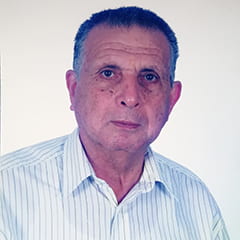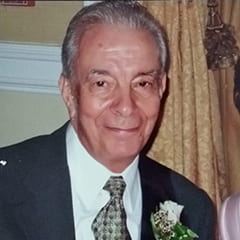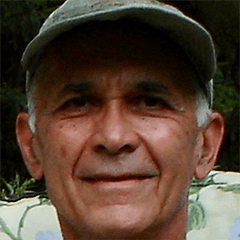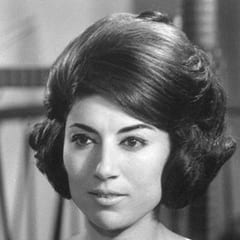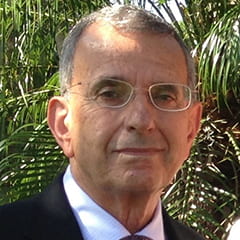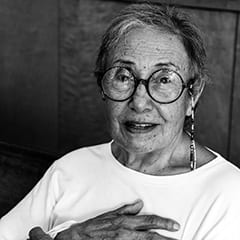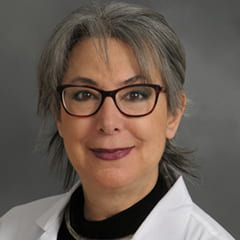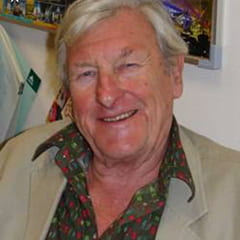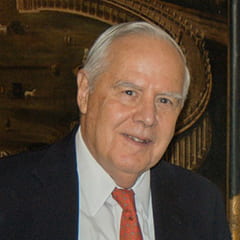Antoine Hanna Sayegh, PhD (BS ’53). Born in Jaffa, Palestine, in 1932, Sayegh passed away on September 6, 2019. After earning his BS degree in chemistry, he received an MS and PhD at Oregon State University in soil and farm crops. He returned to AUB as a professor of soil science at FAFS from 1957–82. In 1976, when AUB sent a group of faculty to Saudi Arabia to advise the Ministry of Agriculture, Sayegh was among the original eight members. In 1982, Sayegh joined his family in Germany and started a consultancy business. Four years later, he joined the UN Food and Agricultural Organization in Rome as a senior soil research officer and worked with them until his retirement and return to Lebanon in 1994. Sayegh is survived by his wife Nibal Chehab Sayegh, his two daughters Diana and Christina, and many nieces and nephews. He will be remembered by his students and colleagues for his dedication, compassion, and generosity.
Raja M. Bitar (BA ’51) passed away in Boca Raton, Florida, on September 24, 2019. With his degree in civil engineering, he traveled to the United States to complete a master’s degree at Georgia Institute of Technology. He had a distinguished career at Westvaco Corporation, where he served as vice president and as president of their subsidiary in Brazil, Rigesa Celulose Papel e Embalagens Ltda. Raja was a dedicated and loyal employee of Westvaco and Rigesa for 31 years. In 1993, he retired to Florida. A man of great integrity and honor, Bitar will be remembered for his kindness, generosity, thoughtfulness, humility, business acumen, and sense of humor. The son of Mulhim Bitar (BA 1908), the first librarian of Arabic publications at AUB who cataloged the collections in the Dewey Decimal system, Raja Bitar is survived by his wife of 50 years Samia Nassif (BA ’64), his three daughters Neda, Layla, and Leena, and nine grandchildren.
Basil Wahid Hakki, PhD, (BEN ’57) of Marco Island, Florida, and Portland, Oregon, died peacefully at home on August 2 after a long battle with pancreatic cancer. He was 84. Born in Damascus, Syria, Hakki earned a doctorate in electrical engineering from the University of Illinois, Champaign-Urbana in 1960. He joined AT&T Bell Laboratories in 1963 and his work there, until his retirement in 2001, resulted in numerous inventions and patents and the development of what became a standard for measuring optical gain in laser diodes, termed the “Hakki-Paoli” method. Upon retirement, he began playing competitive bridge and honed his golf and tennis games. Hakki is survived by his wife of 51 years Maria Hakki, and a son, Morgan, of Portland, Oregon.
Catherine Kano Kikoski (BA ’61) passed away at the age of 79 on March 26, 2019. She spent her youth in Aleppo, Syria. Prior to earning her degree in psychology at AUB, she graduated from the Beirut College for Women (now Lebanese American University) in 1959. In 1963 she earned a master’s degree in psychology from Wesleyan University in Connecticut, and in 1980, she was awarded a EdD in Marriage and Family Therapy from the University of Massachusetts, Amherst. From 1981–86, Kikoski was a psychologist for Catholic Charities in Orange, Massachusetts, and led a foster parent program at Greenfield Community College. In 1986, she moved to Saint Joseph College (now the University of Saint Joseph), where she founded the MA program in Marriage and Family Therapy, which she directed until 2008. An accomplished author in three languages, Arabic, French, and English, Kikoski authored numerous articles on Middle Eastern feminism as well as on marriage and family therapy. She coauthored two books addressing cultural diversity and knowledge creation with her husband John F. Kikowski. Kikoski spent her final years at the Alzheimer’s Resource Center (now Live Well) in Plantsville, Connecticut. She is remembered as a warm and generous person, a dedicated spouse, a devoted mother and grandmother, and an inspirational therapist. Kikoski is survived by her husband John, sons John and Andre, daughter Nicole, five loving grandsons, and a large extended family.
Fuad S. Ashkar (MD ’62). Born in Broumana on June 13, 1935, the son of a Lebanese hotelier and noted poet, Ashkar passed away on August 6, 2019, in Miami, Florida. He completed his medical residency and fellowship in nuclear medicine at University of Miami, Jackson Memorial Hospital, where he met his wife Theresa, who was a Pan Am flight attendant. In addition to his work as a physician, Ashkar was a highly regarded professional who served as chairman for the Probable Cause Panel for the Florida Board of Medicine, a member of the Board of Governors for Florida Medical Quality Assurance, director of the University of Miami/Kuwait Comprehensive Medical Education Program, director of Nuclear Medicine for the University Diagnostic Center in Miami, a diplomat of the American Board of Nuclear Medicine, a fellow of the American College of Endocrinology, chief of medical staff at Kendall Regional Center, and chairman of the Florida Board of Medicine. A recipient of Lebanon’s National Order of the Cedars, Ashkar published over 67 articles in medical literature and four books on science medicine. He holds two patents related to his research on thyroid disease. In addition to his wife Theresa, he is survived by his sisters Mona and Nayla, his daughter Anda, his son Alexander, and two grandchildren.
Huguette Caland (student 1964–68) passed away at the age of 88 in Beirut. A trailblazing artist, Caland was born in 1931 to Bechara El Khoury, Lebanon’s first president following its independence from the French mandate. In 1964, the year of her father’s death, Caland created her first painting and enrolled in the art program at AUB. Her pursuit of a career as an artist took her to Paris, France, and Venice, California. Caland’s work, which was the subject of a Tate St. Ives survey earlier this year, is associated with a strain of feminism in which artists sought to liberate the bodies of women. Provocative, sensual, and erotic, Caland produced an oeuvre that radiated a sense of freedom, courage, and humor. Some of her most winsome works are the abayas she made in 1979 in collaboration with the famed fashion designer Pierre Cardin. Some of these garments were on view earlier this year at the Sharjah Biennial in the United Arab Emirates. There is a celebratory quality to Caland’s work that exemplified her life. She once said, “I love every minute of my life. I squeeze it like an orange and I eat the peel, because I don’t want to miss anything.” In 2017, Caland was the recipient of AUB’s distinguished University Medal. She is predeceased by her husband Paul Caland, and survived by her children Brigitte, Pierre, and Philippe.
Lina Marie Obeid Hannun (MD ’83). Born in New York City 1955, Obeid grew up in Beirut and passed away on November 29, 2019, in Stony Brook, New York. She received her bachelor’s degree in chemistry from Rutgers University and completed a residency in internal medicine and a fellowship in endocrinology at Duke University, where she served on the faculty before moving to the Medical University of South Carolina. In 2012, Obeid joined Stony Brook State University of New York, where she was dean for Research, Distinguished SUNY Professor at the Renaissance School of Medicine, and professor of medicine. Obeid and her husband Dr. Yusuf A. Hannun (BS ’77, MD ’81, DHL ’14) have been widely recognized for their pioneering work in lipid biochemistry and cancer research. In 2019, they shared the Lifetime Achievement Award at the 16th International Conference on Bioactive Lipids in Cancer, Inflammation and Related Diseases. Obeid was the first woman to receive this honor. She is survived by Yusuf, her parents Dr. Sami Obeid and Rosette Obeid; her siblings Kamal, Ramzi, and Jihad Obeid; her children Reem, Awni, and Marya, and two grandchildren.
John M. Munro passed away on July 19, 2018, in Cyprus at the age of 85. Born and schooled in England, he earned a PhD from Washington University in St. Louis, Missouri, and embarked on a career teaching English literature at the University of North Carolina, the University of Toronto, and London University, before arriving at AUB, where he taught from 1965–90. In addition, he served as an associate dean of the Faculty of Arts and Sciences from 1970–74. Munro is well known to the AUB community for his informal and informative history of the university, A Mutual Concern: The Story of the American University of Beirut, published by Caravan Books in 1977. During his time in Lebanon, Munro also developed a career as a freelance journalist and co-producer with his wife Falak Farra (BA ’74, MA ’76) of English language teaching programs for radio in the Arab world. During the Lebanese civil war John participated enthusiastically in amateur performances of the Art Theatre Group. In 1988, he moved to Egypt and was appointed Professor of Mass Communication at the American University in Cairo. Later he became media and political adviser to the European Commission in Cairo. In retirement, Munro taught academic courses on human rights and democratization at the University of Malta. He is the author of several books on various aspects of nineteenth- and twentieth-century British literature. He also wrote prolifically on eclectic topics of Arab culture, ranging from historic photographs to early public transport. He is survived by his wife Falak and his children Peter, Stephen, and Kirsten.
AUB Trustee Emeritus Theodore Van Itallie, MD, passed away on September 14, 2019, at the age of 99 in Old Lyme, Connecticut. Educated at Deerfield Academy, Harvard College, and the then named Columbia University College of Physicians and Surgeons, Van Itallie pioneered research in metabolic diseases and the epidemiology of obesity. He was director of medicine at St. Luke’s Hospital in New York City (1957–75), where he founded the Obesity Research Center and later served as chief of the Division of Metabolism, Nutrition, and Endocrinology. Under his leadership, St. Luke’s (now Mount Sinai St. Luke’s Medical Center) became a Columbia University teaching hospital. Van Itallie was a visiting professor of international medicine at AUB in 1968–69. His ongoing contributions to the university and its hospital led to his election as a trustee in 1976 and a trustee emeritus in 1993. He advised numerous US government officials and agencies—including the National Institutes of Health, the White House, the US Surgeon General, the Food and Drug Administration, and the Department of Agriculture—on human nutrition, recommended dietary allowances and dietary fat, and advanced teaching of nutrition and surgical treatment of obesity. At the time of his death, he was working on a supplement to treat Alzheimer’s disease. He is survived by five children, Lucy, Theodore Jr., Christina, Elizabeth, and Katharine, six grandchildren, and four great-grandchildren.
